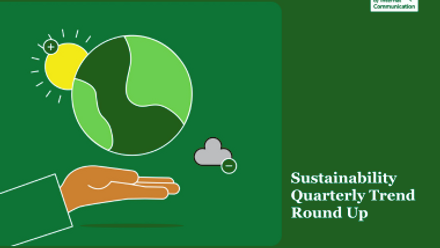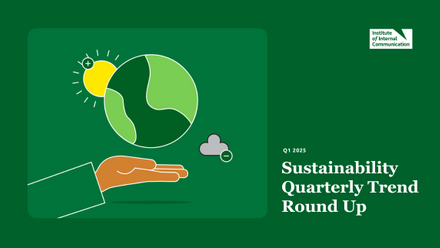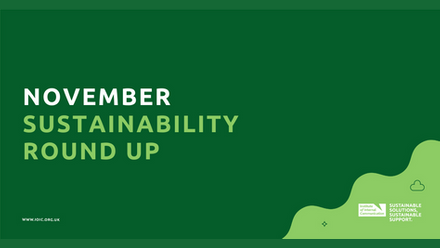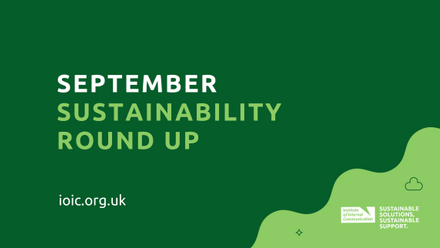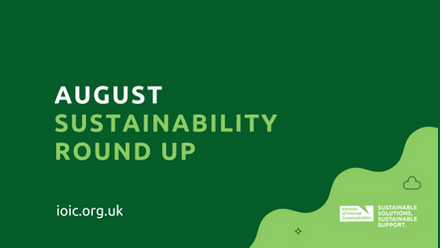At the IoIC, we believe everyone has a moral imperative to reduce consumption and carbon emissions, to protect our planet for future generations.
We also believe there’s a huge opportunity for internal communicators to kick-start and facilitate carbon conversations at work, engaging as many people as possible in the journey towards net-zero business.
With the above in mind, here are some sustainability news items that have caught our eye this month.
Community sustainability
B Corp accreditation is awarded to companies for social and environmental performance, transparency and accountability. Acquiring it demonstrates an organisation’s sense of social responsibility and proves its commitment to balance purpose and profits.
At first only open to US firms, the first wave of B Corp businesses in 2007 totalled 82. The movement has expanded globally over the past 16 years, and there are now more than 7,400 B Corps around the world, of which almost a quarter are UK-based companies, like FatFace and Gousto.
There are a host of reasons why businesses seek B Corp Certification. It enables them to be transparent about their progress beyond profit. It also provides an opportunity for companies to measure and improve their impact on all stakeholders, across all areas of their business. In addition, it’s a useful shorthand to communicate purpose to employees and customers alike.
However, it’s the element of community where many companies report another big benefit, enabling them to engage in a group of businesses (often outside of their own sectors), community events and to connect with other like-minded organisations.
Organisational sustainability
Despite the recent governmental mood-music trying to kick the issue into the long grass, business still has a unique part to play when it comes to sustainability.
Here’s where internal communication comes in. For business to embrace it, the thread of sustainability should be woven wholeheartedly and authentically through all decision-making and action-taking. That means getting all stakeholders on board – and IC is that thread.
But what if your company went one step further and made Mother Nature your CEO? That’s precisely what Dutch vegan dairy company Willicroft has done. Mother Nature also has a seat on the board of beauty brand Faith in Nature and is the sole shareholder of apparel company Patagonia.
In this interview, Brad Vanstone, Willicroft’s co-founder, talks about the benefits and key perspective change brought about by having to report into the ultimate ‘big boss’.
Economic sustainability
The Forum for the Future is a leading international sustainability non-profit that works to accelerate the shift towards what it calls a just and regenerative future that enables both people and the planet to thrive.
It’s just published its Courage to Reform report, which aims to equip individuals, teams and organisations to move beyond inertia and make informed decisions against a backdrop of escalating turbulence.
Today’s businesses are certainly operating in complex environments, but amidst this noise there is one clear signal that we should be paying particular attention to: we’re crossing the 1.5°C threshold.
As a consequence, by 2030 global natural disasters could increase by 40% – that’s 540 natural disasters every year, or more than one per day. That means more extreme temperature events, more droughts and more starvation.
The Forum believes that a transition in the ‘purpose of business’ in society is needed. It must play a societal role that goes beyond a drive to maximise short-term profits and shareholder dividends to the exclusion of all else. As challenges intensify, the need for transformational change and new mindsets to explore the future through a ‘systems change’ lens become more acute.
To help businesses nurture a resilient, healthy operating context, its report includes some useful future-focused tools. Its Business Transition Trajectories set out a range of pathways that can be adopted to help navigate the environmental and social crisis.
In addition, the Five Principles to Transform through Crisis are practices businesses can adopt and adapt – not just to weather immense transformation, but also to prosper in volatile times.
The systems we all work within often no longer align with present requirements. However, internal communication is uniquely placed to help foster change, by transcending organisational siloes and ensuring every internal stakeholder understands the requirement for sustainability. More importantly, it will increasingly be the means by which these stakeholders can step up to help their employers become more sustainable.
Environmental sustainability
It was heartening to read that the prospects of the world staying within the 1.5°C limit on global heating have brightened owing to the “staggering” growth of renewable energy and green investment in the past two years, according to a new report by the world’s energy watchdog, the International Energy Agency.
Fatih Birol, the agency’s executive director and the world’s leading energy economist, says that while much more is needed to be done, the rapid uptake of solar power and electric vehicles were very encouraging.
He claims to feel more optimistic than he did a mere two years ago, with clean energy investments in the last two years seeing an impressive 40% increase. In addition, solar panel installations and EV sales are perfectly in line with what the agency said they should be, to be on track to reach net zero by 2050, and therefore stay within the 1.5°C limit.
With greenhouse gas emissions remaining stubbornly high and recent extreme weather events causing huge anxiety, it’s not all good news, and the report calls for developed economies to bring forward their net zero target dates.
However, it’s always good to share some ‘glimmer-of-light’ stories among the general backdrop of doom-laden tales related to the climate emergency. It’s also beneficial for trying to keep those ‘sostalgia’ levels in check, of course!
Personal sustainability
Anger is by far the most powerful emotion for encouraging climate action, research has found – and is seven times more potent for spurring action than hope.
A Norwegian study asked 2,000 adults how they felt about the climate crisis, and found the link to activism was seven times stronger for anger than it was for hope. It discovered that fear and guilt were the best predictors of policy support, while sadness, fear and hope were the best predictors of behavioural change.
Perhaps a key take-away here for us as IC professionals is that if colleagues fuel their anger at our organisations for inactivity on climate action (perceived or actual), this could well fuel climate activism, whistleblowing and possibly even corporate sabotage.
So, as internal communicators, there is an onus on us to proceed diligently and provide the platforms to have those open conversations at work. Let’s not forget the cautionary tales that emanated from Brewdog, and the ensuing brand damage wrought by its employees’ claims of having to operate within a toxic corporate culture, where their views weren’t listened to or respected.

